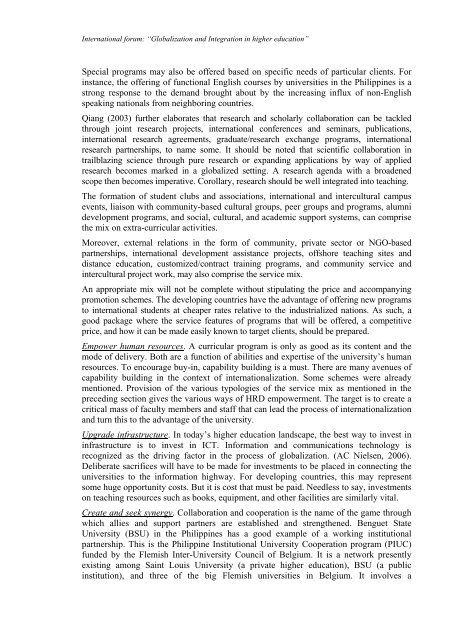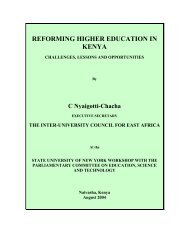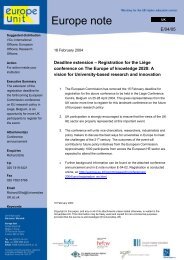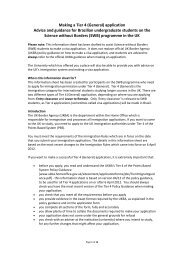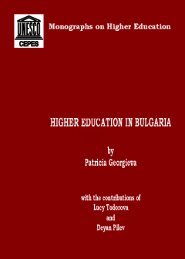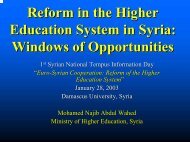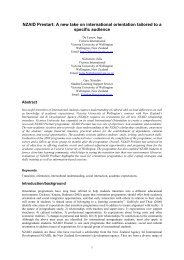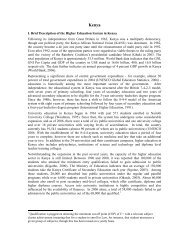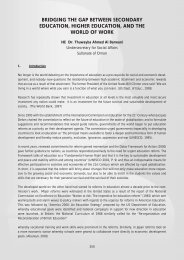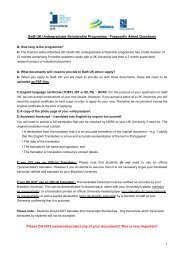POSITIONING TO MEET GLOBAL COMPETITION: THE HIGHER ...
POSITIONING TO MEET GLOBAL COMPETITION: THE HIGHER ...
POSITIONING TO MEET GLOBAL COMPETITION: THE HIGHER ...
Create successful ePaper yourself
Turn your PDF publications into a flip-book with our unique Google optimized e-Paper software.
International forum: “Globalization and Integration in higher education”<br />
Special programs may also be offered based on specific needs of particular clients. For<br />
instance, the offering of functional English courses by universities in the Philippines is a<br />
strong response to the demand brought about by the increasing influx of non-English<br />
speaking nationals from neighboring countries.<br />
Qiang (2003) further elaborates that research and scholarly collaboration can be tackled<br />
through joint research projects, international conferences and seminars, publications,<br />
international research agreements, graduate/research exchange programs, international<br />
research partnerships, to name some. It should be noted that scientific collaboration in<br />
trailblazing science through pure research or expanding applications by way of applied<br />
research becomes marked in a globalized setting. A research agenda with a broadened<br />
scope then becomes imperative. Corollary, research should be well integrated into teaching.<br />
The formation of student clubs and associations, international and intercultural campus<br />
events, liaison with community-based cultural groups, peer groups and programs, alumni<br />
development programs, and social, cultural, and academic support systems, can comprise<br />
the mix on extra-curricular activities.<br />
Moreover, external relations in the form of community, private sector or NGO-based<br />
partnerships, international development assistance projects, offshore teaching sites and<br />
distance education, customized/contract training programs, and community service and<br />
intercultural project work, may also comprise the service mix.<br />
An appropriate mix will not be complete without stipulating the price and accompanying<br />
promotion schemes. The developing countries have the advantage of offering new programs<br />
to international students at cheaper rates relative to the industrialized nations. As such, a<br />
good package where the service features of programs that will be offered, a competitive<br />
price, and how it can be made easily known to target clients, should be prepared.<br />
Empower human resources. A curricular program is only as good as its content and the<br />
mode of delivery. Both are a function of abilities and expertise of the university’s human<br />
resources. To encourage buy-in, capability building is a must. There are many avenues of<br />
capability building in the context of internationalization. Some schemes were already<br />
mentioned. Provision of the various typologies of the service mix as mentioned in the<br />
preceding section gives the various ways of HRD empowerment. The target is to create a<br />
critical mass of faculty members and staff that can lead the process of internationalization<br />
and turn this to the advantage of the university.<br />
Upgrade infrastructure. In today’s higher education landscape, the best way to invest in<br />
infrastructure is to invest in ICT. Information and communications technology is<br />
recognized as the driving factor in the process of globalization. (AC Nielsen, 2006).<br />
Deliberate sacrifices will have to be made for investments to be placed in connecting the<br />
universities to the information highway. For developing countries, this may represent<br />
some huge opportunity costs. But it is cost that must be paid. Needless to say, investments<br />
on teaching resources such as books, equipment, and other facilities are similarly vital.<br />
Create and seek synergy. Collaboration and cooperation is the name of the game through<br />
which allies and support partners are established and strengthened. Benguet State<br />
University (BSU) in the Philippines has a good example of a working institutional<br />
partnership. This is the Philippine Institutional University Cooperation program (PIUC)<br />
funded by the Flemish Inter-University Council of Belgium. It is a network presently<br />
existing among Saint Louis University (a private higher education), BSU (a public<br />
institution), and three of the big Flemish universities in Belgium. It involves a


